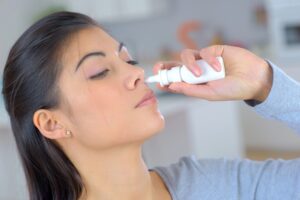September 26, 2025 | Black & Kletz Allergy
 SARS-CoV-2 is the name of the coronavirus that is responsible for the COVID-19 pandemic that caused millions of deaths worldwide. Although vaccination and established population immunity have substantially mitigated the severity of acute SARS-CoV-2 infections, the virus continues to infect millions of people resulting in a number of hospitalizations and deaths. There is a need for an effective pre-exposure prophylaxis for the general population, particularly for high-risk groups such as individuals with preexisting conditions and the elderly.
SARS-CoV-2 is the name of the coronavirus that is responsible for the COVID-19 pandemic that caused millions of deaths worldwide. Although vaccination and established population immunity have substantially mitigated the severity of acute SARS-CoV-2 infections, the virus continues to infect millions of people resulting in a number of hospitalizations and deaths. There is a need for an effective pre-exposure prophylaxis for the general population, particularly for high-risk groups such as individuals with preexisting conditions and the elderly.
Azelastine is a second-generation antihistamine, which is commonly used as a nasal spray under the trade name Astelin or Astepro. It is used for and quite effective for the relief of perennial and seasonal allergic rhinitis (i.e., hay fever) symptoms such as sneezing, runny nose, nasal congestion, post-nasal drip, itchy nose, itchy throat, sinus congestion, sinus headaches, itchy eyes, puffy eyes, watery eyes, and/or redness of the eyes. Azelastine also has previously demonstrated anti-viral activity against respiratory viruses such as influenza (i.e., flu), respiratory syncytial virus (RSV), and some coronaviruses, in addition to its anti-allergic and anti-inflammatory properties.
Clinical trials have demonstrated that azelastine nasal spray reduces viral load in patients with confirmed SARS-CoV-2 infection, suggesting therapeutic efficacy in the acute treatment of COVID-19. These findings prompted researchers to study whether azelastine can also be used as a prophylaxis to prevent Covid-19 infection.
In a clinical trial published in the Journal of American Medical Association-Internal Medicine this month (September 2025), a team of investigators attempted to shed further light on this topic. They recruited 450 healthy volunteers who were 18 to 65 years of age with no signs of an acute infection for the study. Participants were randomly assigned 1:1 to receive azelastine 0.1% nasal spray or placebo 3 times a day for 56 days. SARS-CoV-2 rapid antigen testing (RAT) was conducted twice a week with positive results confirmed by polymerase chain reaction (PCR).
The primary end point was the number of polymerase chain reaction-confirmed SARS-CoV-2 infections during the study. The results of the trial revealed that the incidence of PCR-confirmed SARS-CoV-2 infection was significantly lower in the azelastine group compared with the placebo group. As secondary end points, azelastine demonstrated an increase in mean time to SARS-CoV-2 infection among infected individuals, a reduction of the overall number of PCR-confirmed symptomatic infections, and a lower incidence of PCR-confirmed rhinovirus infections. Note that rhinovirus is the most common cause of the common cold.
Adverse events were comparable between the groups, except for a bitter taste which was experienced by more individuals in the azelastine group compared to placebo. Azelastine nasal spray has long been known to cause a bitter taste in one’s mouth in patients using the nasal spray for the treatment of allergic rhinitis.
The nasal mucus membrane, as the primary site of viral entry and replication, plays a critical role in the pathogenesis of respiratory viral infections. The ability of locally applied and locally acting azelastine nasal spray to significantly reduce SARS-CoV-2 and overall upper respiratory tract infections underscores the efficacy of topical nasal interventions.
The findings of this randomized clinical trial suggest that azelastine nasal spray may reduce the incidence of respiratory infections caused by SARS-CoV-2. Although not studied yet, maybe other nasal antihistamines such as olopatadine (i.e., Patanase) may also reduce or prevent the incidence of respiratory infections caused by SARS-CoV-2.
The board certified allergy specialists at Black & Kletz Allergy have 3 convenient locations with on-site parking located in Washington, DC, McLean, VA (Tysons Corner, VA), and Manassas, VA. The Washington, DC and McLean, VA offices are Metro accessible and we offer a free shuttle that runs between the McLean, VA office and the Spring Hill metro station on the silver line. The allergy doctors at Black & Kletz Allergy are extremely knowledgeable regarding allergic rhinitis (i.e., hay fever) as well as non-allergic rhinitis. We are very experienced using azelastine for the treatment of allergic rhinitis. We diagnose and treat both adult and pediatric patients. In addition, we treat patients with food, insect sting, medication, and skin allergies, as well as asthma, sinus disease, eosinophilic esophagitis, and immunological disorders. To schedule an appointment, please call any of our offices or you may alternatively click Request an Appointment and we will respond within 24 hours by the next business day. We have been servicing the Washington, DC, Northern Virginia, and Maryland metropolitan area for more than 5 decades and we look forward to providing you with comprehensive state-of the-art allergy care in a welcoming and professional environment.












